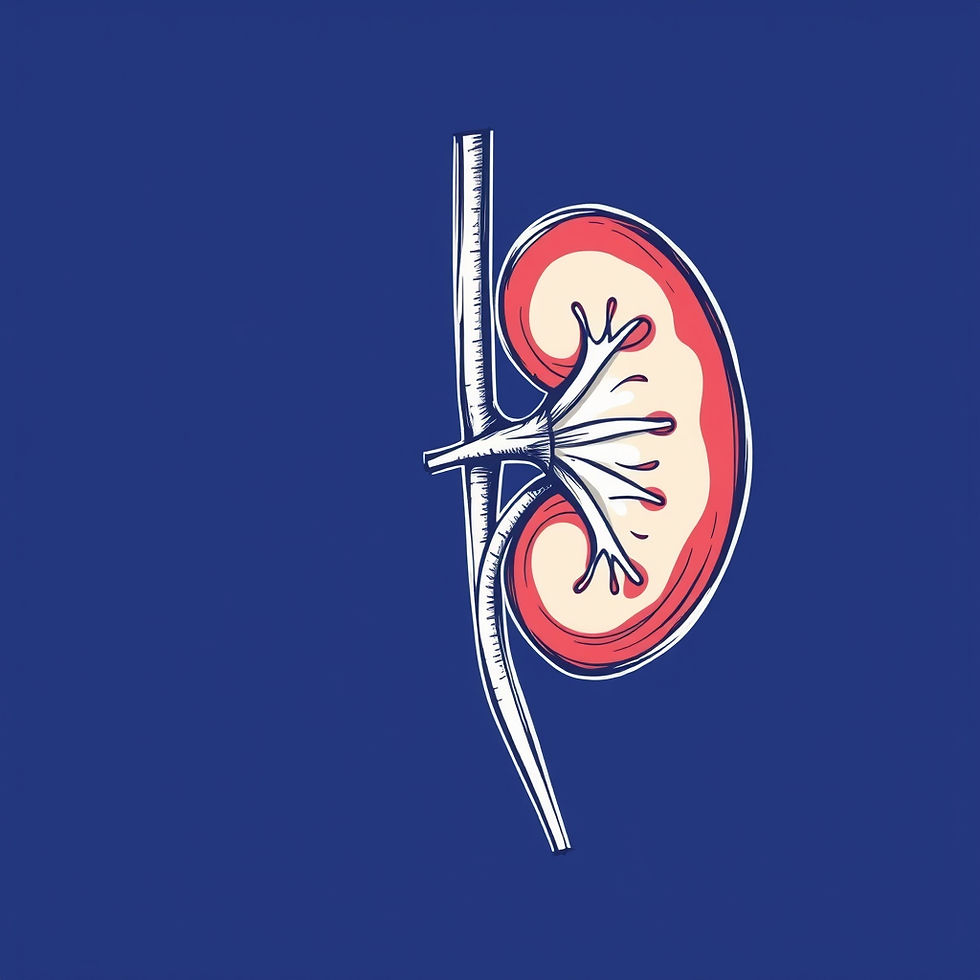What Can I do to Prepare for Transplant?
- Tessa Novick
- Sep 17, 2025
- 3 min read
Updated: Sep 17, 2025

I get this question a lot. First of all, congratulations! This is such an exciting time for you. Now, let's get you ready. Whether you’re on dialysis and listed for transplant, or you have a donor and aren’t on dialysis, there are several things you can do to optimize your experience. This advice also applies to you if you're a donor.
Pre-Surgery
Lift weights. If you aren’t already doing so, it’s time to incorporate mobility and strength training into your daily routine. Seriously, now is the time to get a trainer if you need one. This piece is critical. Even simple things like standing from sitting, or push-ups against a wall make a difference. Tai Chi and yoga are terrific low impact exercises that help you maintain mobility and strength and help with stress. Kidney disease already makes it difficult to maintain muscle mass, and deconditioning could make your recovery difficult.
Get your gut ready. Eating a high fiber diet promotes the growth of healthy bacteria which may prevent complications (like hospital acquired diarrhea) which could keep you there longer. Try to eat every color of the rainbow every day, and eat 3-4 servings of vegetables and 3-4 servings of fruit/day. Consider adding a soluble fiber supplement if eating high fiber foods is difficult for you. Eat fermented foods like yogurt, kefir, and kimchi for natural sources of probiotics.
Develop a mind-body practice routine. Use visualizations, affirmations, and meditations around surgery time. These practices actually may lower your pain, alleviate anxiety, and help you sleep. However, it takes practice so start before the surgery. The Monroe Institute studies the impact of sound frequencies on health, and has several meditations and music options to choose from. Some apps to explore: Expand, Headspace, and Insight Timer. These apps also have classes (many for free) if you’re new to these practices.
In the Hospital and Aftercare
Pack a Hospital Bag: Your sleep in the hospital is important for recovery, but the hospital is loud and bright. Consider packing some ear plugs, an eye mask, a portable white noise machine, and comfortable pajamas. Massage, chamomile, and melatonin also help with sleep. Other things you might experience include sore throat, dry mouth, dry eyes, pain, nausea, urinary retention and agitation. Green tea, sage tea, and honey may help with post-surgery sore throat. Aromatherapy products help with nausea and pain. Quease Ease has lavender, peppermint, and ginger oils that reduce surgery related nausea. A relaxing playlist might help with agitation (bring headphones). Here is where guided visualization and meditation also come in – make sure your apps are downloaded and ready.
Plan your post-op nutrition needs. You’ll want to get in nutritious meals to help with healing. You will need about 1.2-1.5 g/kg body weight of protein per day, which is approximately what you should already be eating if you’re on dialysis. If you aren’t on dialysis and were put on a low protein diet, this will be a change for you. The source of your food matters – I recommend filling your plate with vegetables, plant proteins (like tofu and tempeh), whole grains, healthy fats (avocado, olive oil, nuts), and fish. Check out information on the anti-inflammatory diet. Great kidney friendly meal delivery services include PurpleCarrot and Splendidspoon.
Plan for possible pain. Nonpharmacological things to explore include acupuncture, music therapy, clinical hypnosis, guided imagery, and aromatherapy.
Bring a Planner. You will likely have a whole new routine after the surgery. This will include new medications, doctors’ appointments, and physical therapy. Make sure family members document for you if you are unable. Be sure to write down how to contact your transplant team before leaving the hospital.
Plan for visitors. People will want to come see you! However, your immune system will be suppressed so it's important to take precautions. Make sure you have lots of face masks and hand sanitizer ready. Encourage everyone in your home to have their routine vaccinations and annual flu and COVID shots.
Be nice to yourself. You've been through so much to get to this point. Give yourself grace. You're doing great!
To summarize, getting ready for a kidney transplant isn’t just about the surgery—it’s about preparing your body, mind, and environment. Build strength with exercise, eat a colorful, high-fiber diet, and try meditation to ease stress. Pack smart for the hospital, fuel recovery with protein-rich, anti-inflammatory foods, and stay organized with your new routine. Most of all, protect your health, set boundaries with visitors, and give yourself grace—you’ve come so far!



Comments